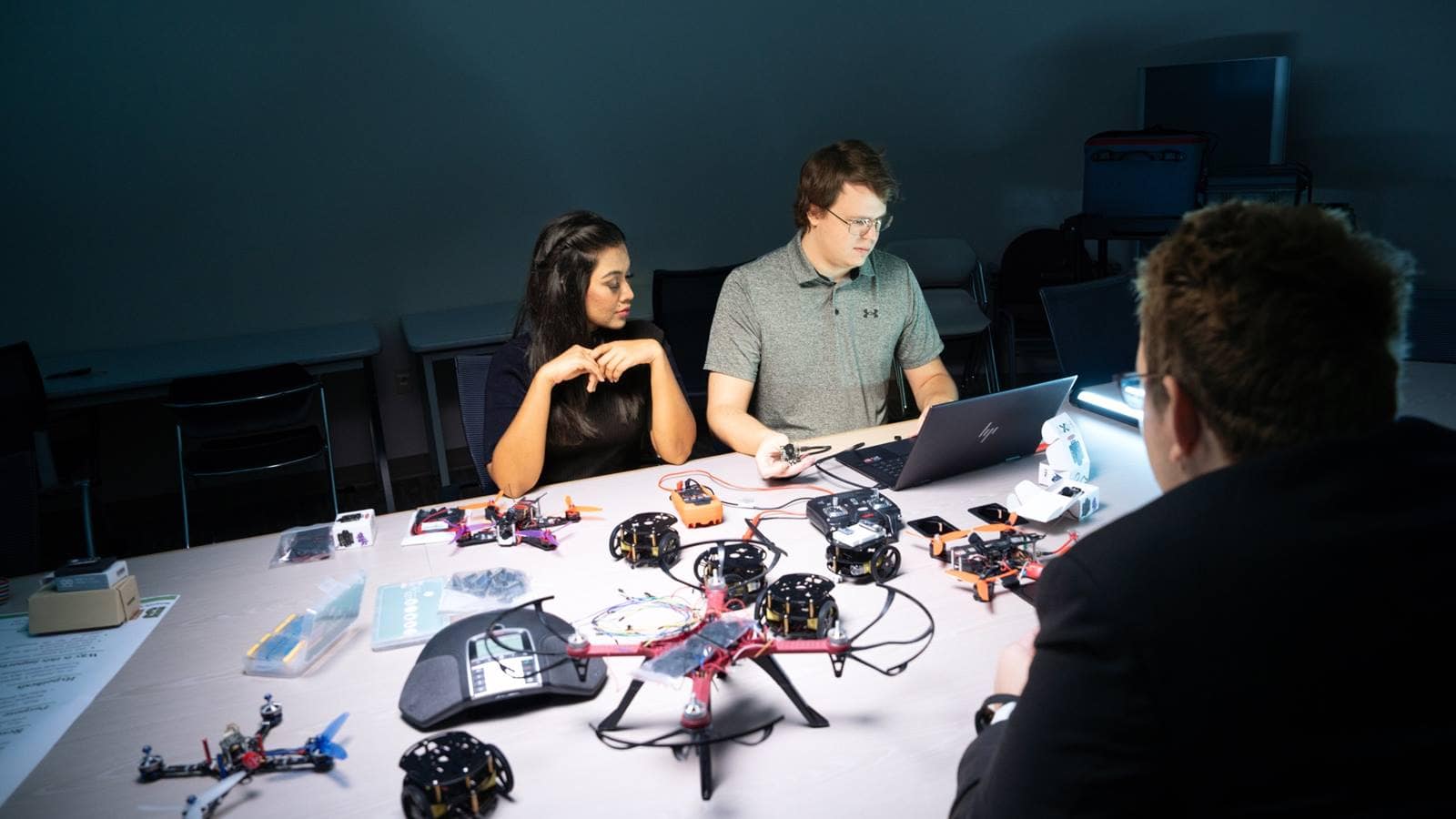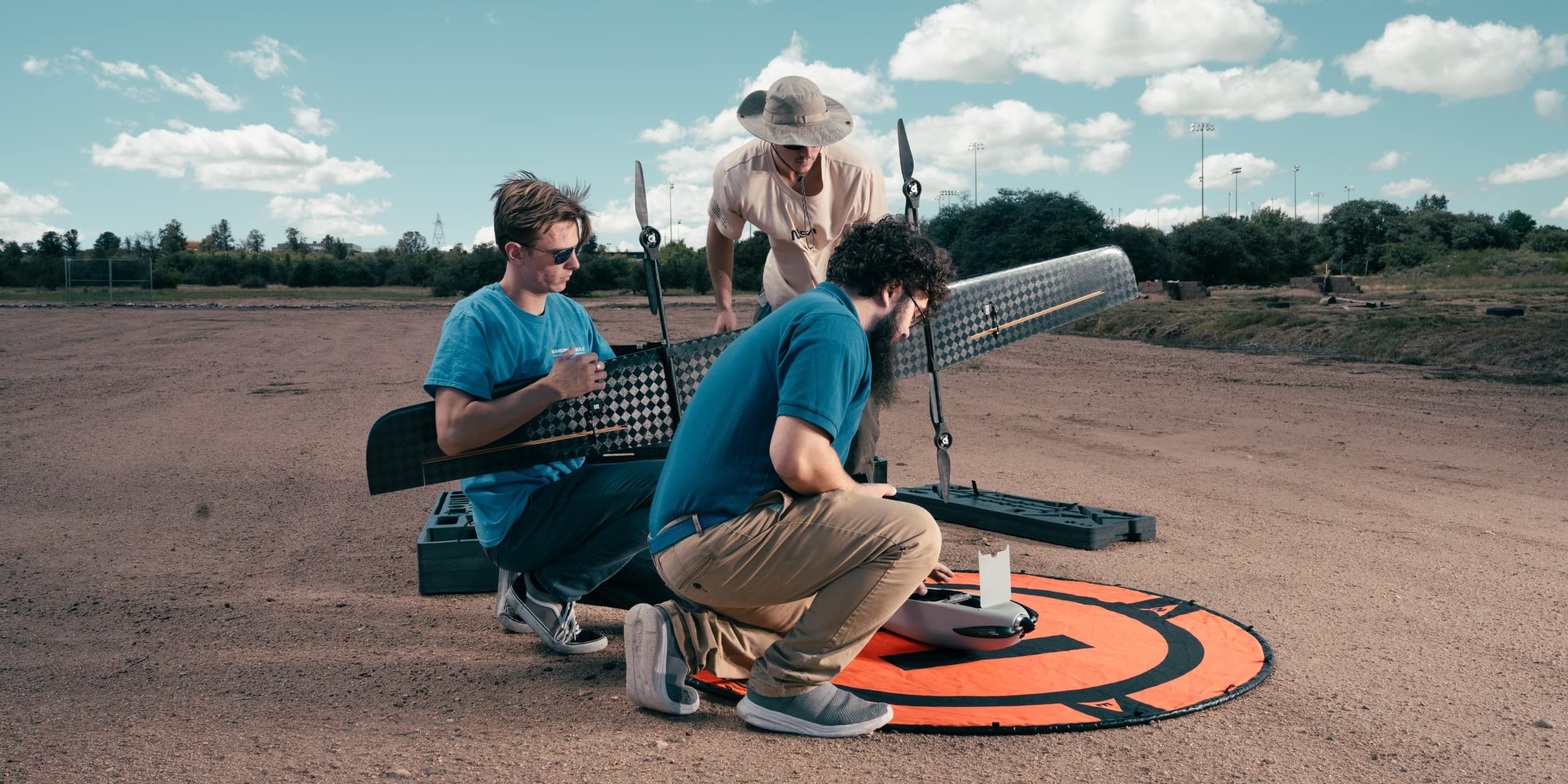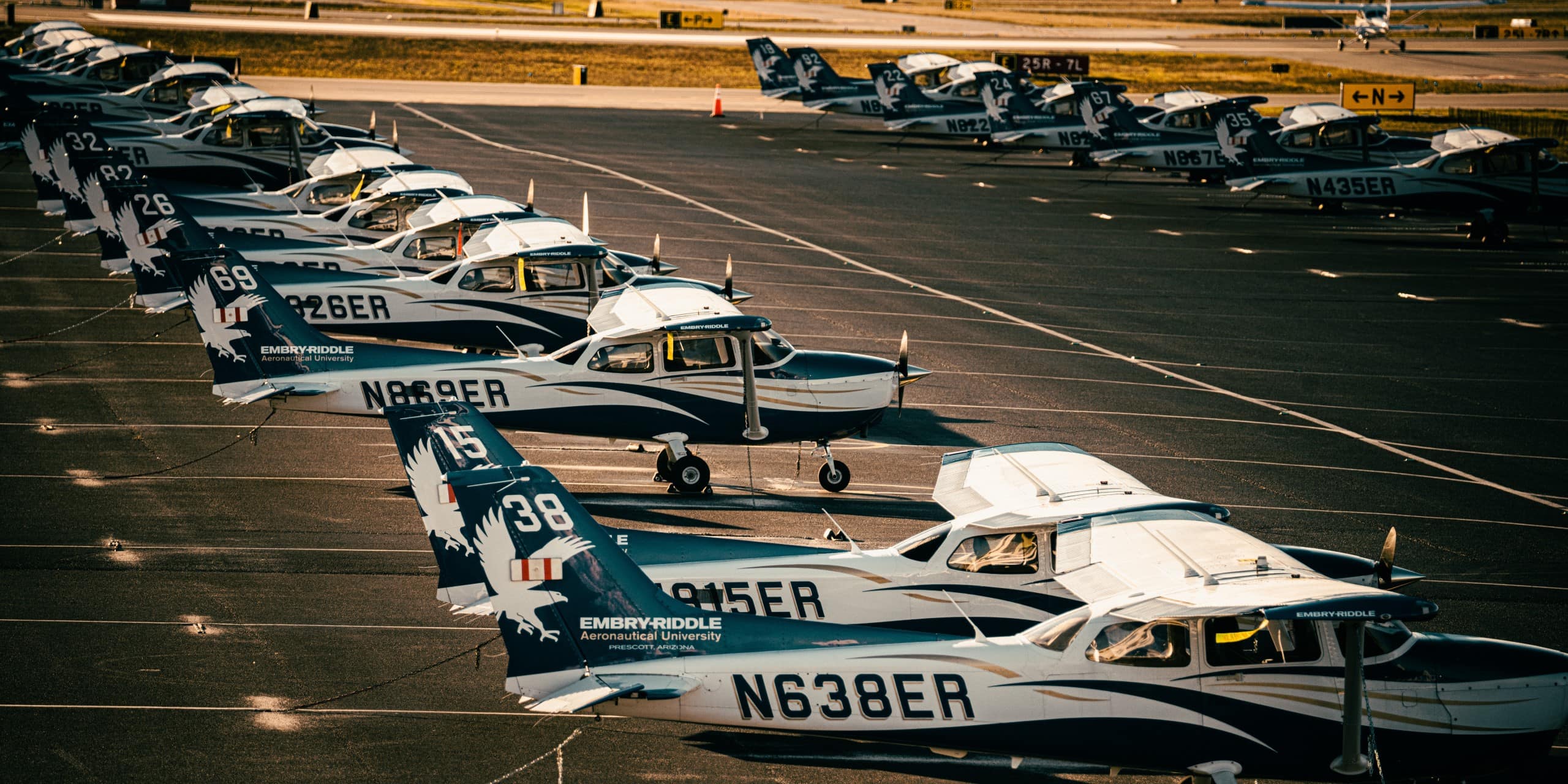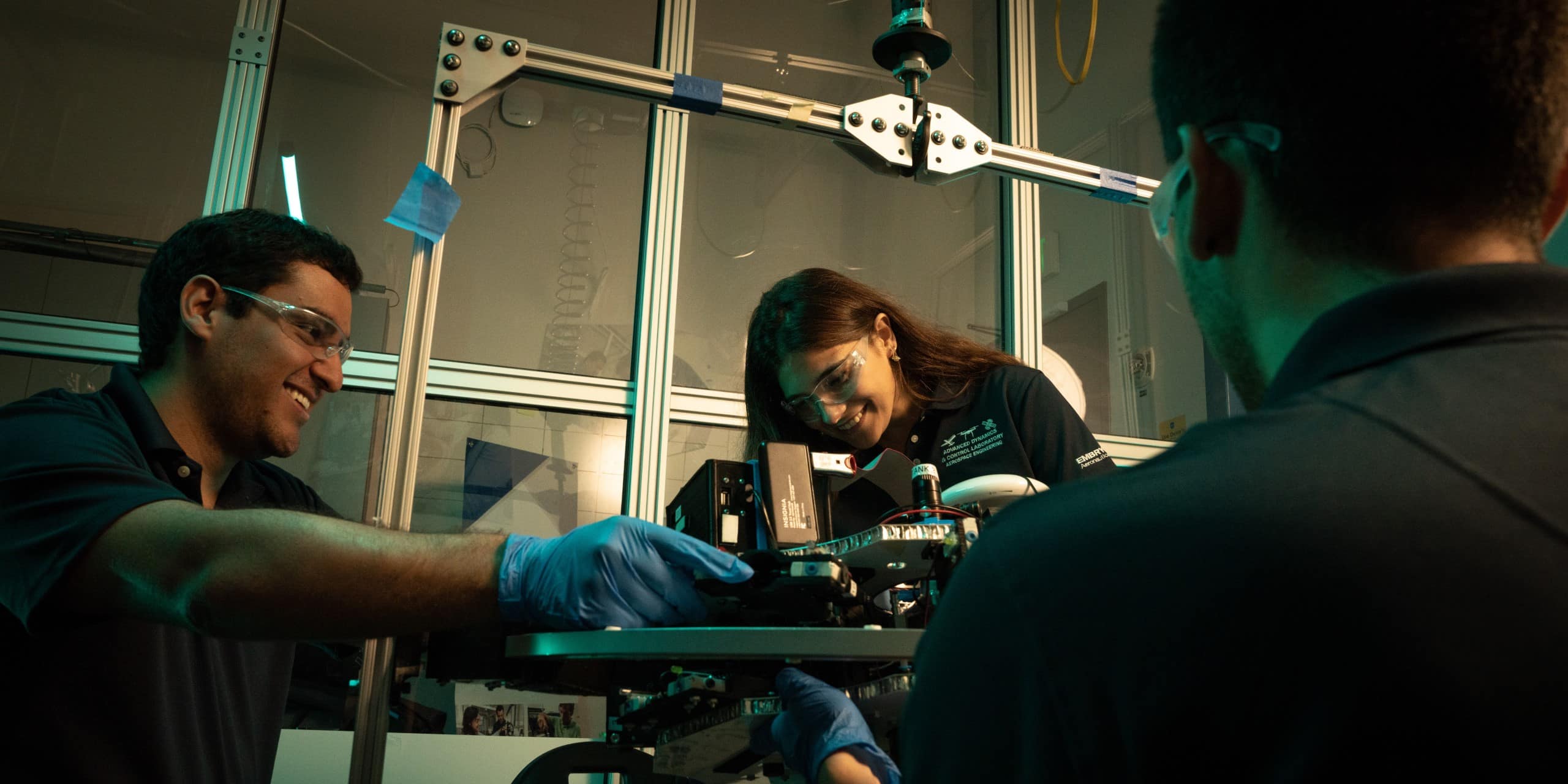
Master of Science in
Uncrewed & Autonomous Systems Engineering
The master's degree allows students to focus on the engineering of uncrewed and autonomous systems including drones and aircraft systems.
About the Master of Science in Uncrewed and Autonomous Systems Engineering
Embry‑Riddle is a pioneering institution in uncrewed and robotics education. In the Master of Science in Uncrewed and Autonomous Systems Engineering, a student’s prior engineering education and interest in uncrewed flight is the ideal combination to take their career to the next level. Whether students are recent graduates or working professionals, this degree will help them transition into new, exciting roles in the burgeoning field of uncrewed systems.
Students benefit from small class sizes and hands-on learning as they proceed through the Uncrewed and Autonomous Systems Engineering curriculum. Beyond the aircraft focus, students will study autonomous systems related to automobiles and drones, surface and undersea marine vessels and spacecraft.
Student Learning Outcomes
What you will learn while pursuing an Uncrewed and Autonomous Systems Engineering degree:
- Apply fundamental engineering practices to analyze, design and support the implementation and development of uncrewed and/or autonomous systems
- Apply knowledge of advanced topics in uncrewed and autonomous systems engineering
- Communicate effectively on issues pertaining to uncrewed and autonomous systems
Uncrewed and Autonomous Systems Engineering Career Opportunities
Careers and Employers
Autonomous Systems Engineering master's graduates often secure positions in fields such as automation engineering, software engineering, software verification engineering and 3D simulation engineering.
UAS master's degree graduates tend to enter the industry with companies such as:
- Collins Aerospace
- Iris Automation
- DinoPlusAI
- Radiance Technlogies, Inc.
Uncrewed and Autonomous Systems Engineering Salary Information
As of 2023, graduates with a degree in uncrewed systems tend to receive competitive salaries, with an average income of $84,602 annually.
DETAILS
About Uncrewed & Autonomous Systems Engineering at the Daytona Beach, FL Campus
Housed in the College of Engineering, the M.S. in Uncrewed & Autonomous Systems Engineering is one of the first — and still one of the few — programs to offer the opportunity to study the engineering of uncrewed and autonomous systems.
The master's degree prepares students to work in an industry developing systems that operate along a spectrum of autonomy, from drones and autonomous robotics to surface water and underwater vessels and spacecraft. Students will have access to the highly specialized labs and facilities within the College of Engineering.
Tracks/Specialties and/or Certificates
Students can customize their Autonomous Systems Engineering degree by choosing from these available tracks:
- Technical: 15 credits
- Uncrewed Aircraft Systems: 15 credits
- Systems Engineering: 15 credits
Uncrewed and Autonomous Systems Engineering Information
- Credits: 30
- Online or In-Person: In-Person
- Thesis: Thesis, Capstone & Coursework Options
Helpful Links
- Tour our Daytona Beach Campus
- Discover the Department's Faculty
- Explore the Fields of Study: Engineering & Space & Aviation
- Find Related Clubs & Organizations
Areas of Concentration
Technical Area of Concentration
The Technical Area of Concentration supports the Thesis, Capstone, and Coursework only options.
| Required Courses for Technical Concentration | 15 | |
| AE/EE/ME 527 | Modern Control Systems | 3 |
| EE 510 | Linear Systems | 3 |
| EE 528 | Sensors and Data Links | 3 |
| ME 503 | Unmanned and Autonomous Vehicle Systems | 3 |
| SYS 505 | System Safety and Certification | 3 |
| Thesis Option | ||
| Two (2) Electives Required | 6 | |
| UAS 700 | Thesis | 9 |
| Capstone Option | ||
| Three (3) Electives Required | 9 | |
| UAS 691 | Unmanned and Autonomous Systems Capstone Design Project I | 3 |
| UAS 692 | Unmanned and Autonomous Systems Capstone Design Project II | 3 |
| Coursework Only Option | ||
| Five (5) Electives | 15 | |
| Total | 30 | |
Unmanned Aircraft Systems Area of Concentration
The UAS Area of Concentration only supports the Capstone Option
Required Courses UAS Concentration | ||
| AE/EE/ME 527 | Modern Control Systems | 3 |
| EE 510 | Linear Systems | 3 |
| EE 528 | Sensors and Data Links | 3 |
| ME 503 | Unmanned and Autonomous Vehicle Systems | 3 |
| SYS 505 | System Safety and Certification | 3 |
Elective Courses for UAS Concentration | ||
| AE 506 | Airplane Dynamic Stability | 3 |
| AE 623 | Navigation, Guidance and Control | 3 |
| AE 626 | Advanced Topics in Discrete Control Theory | 3 |
Capstone for UAS Concentration | ||
| UAS 691 | Unmanned and Autonomous Systems Capstone Design Project I | 3 |
| UAS 692 | Unmanned and Autonomous Systems Capstone Design Project II | 3 |
| Total Credits | 30 | |
Systems Engineering Area of Concentration
The Systems Engineering Area of Concentration only supports the Capstone Option.
Required Courses for Systems Engineering Concentration | ||
| ME 503 | Unmanned and Autonomous Vehicle Systems | 3 |
| SYS 505 | System Safety and Certification | 3 |
| SYS 530 | System Requirements Analysis and Modeling | 3 |
| UAS 501 | Introduction to Unmanned Aircraft Design | 3 |
| SE 535/600 | User Interface Design and Evaluation | 3 |
Elective Courses for Systems Engineering Concentration | ||
| Three (3) Electives | 9 | |
Capstone for Systems Engineering Concentration | ||
| UAS 691 | Unmanned and Autonomous Systems Capstone Design Project I | 3 |
| UAS 692 | Unmanned and Autonomous Systems Capstone Design Project II | 3 |
| Total Credits | 30 | |
Approved Electives
| AE 502 | Strength and Fatigue of Materials | 3 |
| AE 506 | Airplane Dynamic Stability | 3 |
| AE 516 | Computational Aeronautical Fluid Dynamics | 3 |
| AE 522 | Analysis of Aircraft Composite Materials | 3 |
| AE 526 | Engineering Optimization | 3 |
| AE 610 | Advanced Computational Fluid Dynamics | 3 |
| AE 631 | Aeroacoustics | 3 |
| AE 640 | Turbine Engine Propulsion Systems | 3 |
| CEC 510 | Digital Signal Processing | 3 |
| CEC 526 | Sensor Data Fusion | 3 |
| CEC 527 | Mobile Sensor Networks | 3 |
| CEC 530 | Image Processing and Machine Vision | 3 |
| CEC 610 | State and Parameter Estimation | 3 |
| CS 528 | Multi-Agent Systems | 3 |
| CS 529 | Computer Security | 3 |
| EE 500 | Digital Control Systems | 3 |
| EE 505 | Advanced Mechatronics | 3 |
| EE 525 | Avionics and Radio Navigation | 3 |
| EE 529 | Electro-Optical Systems | 3 |
| EE 625 | Satellite-Based Communications and Navigation | 3 |
| ME 520 | Sensor Processing with Applications | 3 |
| ME 523 | Modeling and Simulation of Linear Dynamic Systems | 3 |
| ME 613 | Advanced Model-Based Control Design | 3 |
| ME 614 | Multidisciplinary Design Optimization | 3 |
| ME 615 | Pattern Recognition and Machine Learning | 3 |
| SE 535 | User Interface Design and Evaluation | 3 |
| SE 600 | User Interface Design for Unmanned Systems | 3 |
| SYS 500 | Fundamentals of Systems Engineering | 3 |
| SYS 530 | System Requirements Analysis and Modeling | 3 |
| SYS 560 | Introduction to Systems Engineering Management | 3 |
| SYS 610 | System Architecture Design and Modeling | 3 |
| SYS 625 | System Quality Assurance | 3 |
| SYS 660 | Organizational Systems Management | 3 |
Additional Approved Electives (Systems Engineering AOC Only)
ERAU-WW courses (limit1, Systems Engineering AOC only)
- UNSY 601: Unmanned Systems Command, Control, and Communication
- UNSY 605: Unmanned System Sensing, Perception, and Processing
- UNSY 610: Unmanned System Autonomy and Automation
- UNSY 615: Unmanned Systems Power, Propulsion and Maneuvering
Get Started Now:
Summary
30 Credits
Estimate your tuition by using the Tuition Calculator
View Financial Aid Information
Learn about our General Education
Find out about transferring credits to this degree
Learn more about our Veterans & Military benefits
View our Academic Calendar




